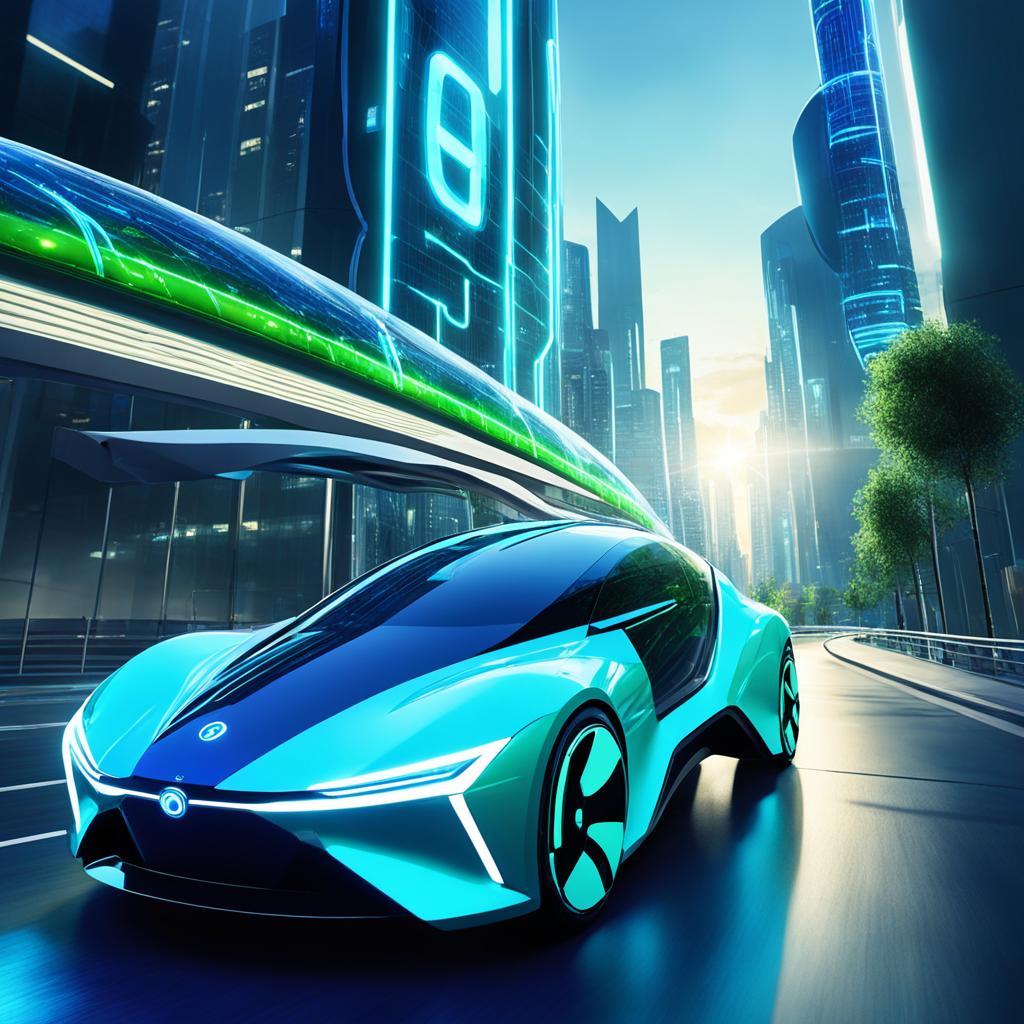Have you ever wondered how far a car can go with just 1 kg of hydrogen? The answer may surprise you. Hydrogen, known as the fuel of the future, has the potential to revolutionize the way we travel and reduce our carbon footprint. When fed into a fuel cell, hydrogen can power vehicles without emitting harmful emissions, making it a green energy solution.
But how much distance can you cover with just 1 kg of hydrogen? Currently, a fuel-cell electric vehicle with 1 kg of hydrogen can drive approximately 60 miles. That’s equivalent to the mileage of a car running on 1 gallon of gasoline. However, efforts are being made to improve the efficiency of hydrogen fuel cells, aiming to achieve nearly 100 miles on just 1 kg of hydrogen.
In this article, we will explore the advantages of hydrogen fuel, the production process, safety measures, and the cost of driving a hydrogen car. We’ll also discuss the potential of hydrogen as the fuel of the future and the promise of hydrogen fuel cell vehicles. So, buckle up and let’s delve into the world of hydrogen-powered transportation!
Advantages of Hydrogen Fuel
Hydrogen fuel offers several advantages in the realm of clean energy and zero-emissions vehicles. One of the most significant benefits is that vehicles powered by hydrogen fuel cells produce only heat and clean water as emissions, making them truly zero-emissions vehicles. This means that they have a minimal impact on air quality and can significantly reduce pollution in urban areas.
Fuel cells, which convert hydrogen into electricity to power vehicles, are also more efficient than traditional combustion engines. This efficiency translates into a smoother and quieter driving experience, without the noise and vibration associated with internal combustion engines. Additionally, hydrogen fuel allows for longer travel distances with less refueling, which is especially advantageous for heavy-duty vehicles like tractor trailers and buses.
Another advantage of hydrogen fuel is its versatility. Hydrogen can be stored and used to provide cooling or heating while the vehicle is idle, without contributing to air pollution. This feature is particularly useful in hot climates, where it can help maintain the temperature inside the vehicle without relying on the engine running.
Furthermore, hydrogen fuel is a clean energy source that can be produced from a variety of renewable sources such as solar and wind power. This makes hydrogen fuel a sustainable option for reducing greenhouse gas emissions and combating climate change.
Overall, the advantages of hydrogen fuel make it a promising solution for achieving cleaner and more sustainable transportation.
INSERT CAPTION: Hydrogen fuel cell vehicles are zero-emissions vehicles that produce only heat and clean water as emissions.
Hydrogen Fuel Production and Safety

Hydrogen fuel is produced through a process called water electrolysis. This process involves the decomposition of water into pure hydrogen and oxygen ions using electricity. While electrolysis is an effective method for hydrogen fuel production, it does require additional energy. Compared to charging electric vehicle batteries directly, the efficiency of the electrolysis process is lower.
Despite concerns about safety, hydrogen fuel is actually safer than gasoline. Hydrogen is 14 times lighter than air, which means it quickly disperses in the event of a leak. In addition, hydrogen fuel produces a narrow flame when ignited, making it less prone to accidental fires. Manufacturers ensure the safety of hydrogen fuel storage tanks through the implementation of multi-layered structures and protection systems. These measures help prevent leaks and minimize the risk of accidents.
| Hydrogen Fuel Production | H3 Safety | Hydrogen Tank |
|---|---|---|
| Water Electrolysis | 14 times lighter than air | Multi-layered structures |
| Additional energy required | Narrow flame in case of a leak | Protection systems |
| Lower efficiency compared to charging EV batteries |
Cost of Driving a Hydrogen Car

The cost of operating a hydrogen car depends on various factors, including the cost of manufacturing hydrogen fuel and local taxes. Currently, the price of hydrogen fuel is higher compared to gasoline or diesel, which can impact the overall cost of driving a hydrogen car.
In Europe, the average price for a kilogram of hydrogen is about 12.85 euros. While hydrogen cars are generally more fuel-efficient than their gasoline or diesel counterparts, they do require a larger quantity of fuel to achieve the same mileage.
On average, a hydrogen car consumes around 0.8 kilograms of hydrogen per 100 kilometers. This means that for driving a distance of 100 kilometers, the cost of the hydrogen fuel would be around 10.28 euros.
In comparison, a gasoline or diesel car with an average fuel consumption of 6.6 liters would cost approximately 12.54 euros to travel the same distance.
| Fuel Type | Average Consumption | Cost per 100 Kilometers |
|---|---|---|
| Hydrogen | 0.8 kilograms | 10.28 euros |
| Gasoline/Diesel | 6.6 liters | 12.54 euros |
While the initial cost of a hydrogen car may be higher, factors such as fuel efficiency and potential tax incentives can influence the overall cost of ownership. As hydrogen fuel production and infrastructure improve, there is potential for the cost of hydrogen fuel to decrease, making hydrogen cars more accessible to a wider range of drivers.
With ongoing advancements in technology and increased adoption of hydrogen fuel, it is expected that the cost of driving a hydrogen car will become more competitive with traditional fuel-powered vehicles. As the demand for green transportation solutions grows, hydrogen fuel may play a significant role in achieving a sustainable and environmentally friendly future.
Hydrogen as the Fuel of the Future

Hydrogen fuel holds immense potential as a green transportation solution and a future fuel alternative to traditional combustion engines. With its zero emissions and comparable range to combustion cars, hydrogen cars offer several advantages in the pursuit of sustainable transportation.
However, there are challenges that need to be addressed for hydrogen to become a widely adopted fuel source. One of the main challenges is the transportation and storage of hydrogen. Hydrogen is a highly flammable gas and requires special infrastructure to ensure safe handling and distribution.
Despite these challenges, the future of hydrogen car technology holds the key to its viability as a sustainable alternative to battery electric vehicles (BEVs). Ongoing advancements in technology and infrastructure development will determine whether hydrogen cars become a practical option for the masses.
One of the major advantages of hydrogen as a fuel is its widespread availability. Hydrogen can be produced from various sources, including renewable energy, making it a greener alternative to fossil fuels. It also has a high fuel value, providing comparable range and performance to traditional combustion engines.
In addition to its availability and performance, hydrogen fuel offers inherent advantages such as faster refueling times compared to electric vehicles. While electric vehicles require hours to recharge, hydrogen fuel cell vehicles can be refueled in a matter of minutes, similar to traditional gasoline-powered vehicles.
However, there are also disadvantages to consider. One of the main drawbacks of hydrogen fuel is the current cost of production and infrastructure. The price of hydrogen fuel is higher compared to gasoline or diesel, and building the necessary refueling infrastructure requires significant investment.
Despite these challenges, hydrogen fuel shows promise as a means of reducing greenhouse gas emissions and achieving greener transportation. As advancements in technology and infrastructure continue, the feasibility and widespread adoption of hydrogen cars will become clearer.
Ultimately, the future of green transportation relies on a balanced mix of different fuel technologies. While battery electric vehicles (BEVs) have gained traction in recent years, hydrogen fuel has the potential to play a significant role in our transition to a more sustainable transportation system.
| Advantages of Hydrogen Fuel | Disadvantages of Hydrogen Fuel |
|---|---|
|
|
The Promise of Hydrogen Fuel Cell Vehicles
Hydrogen fuel cell vehicles hold great promise as the vehicles of the future, representing a significant advancement in green propulsion technologies. These vehicles utilize fuel cells to generate electricity through a chemical reaction between hydrogen and oxygen. The result is a clean and efficient power source that produces only water as emissions.
One of the key advantages of hydrogen fuel cell vehicles is their range, which is comparable to that of conventional combustion cars. With advancements in fuel cell technology and infrastructure, fuel cell vehicles can travel similar distances without the need for frequent refueling.
To enhance the performance and safety of fuel cell vehicles, manufacturers have started utilizing lightweight and durable materials in their production. For example, EPP foamed plastic, known for its excellent strength-to-weight ratio and impact resistance, can contribute to improved vehicle efficiency and overall safety standards.
The development of hydrogen fuel infrastructure is crucial for the widespread adoption of fuel cell vehicles. As hydrogen becomes more readily available through dedicated refueling stations, drivers will have easier access to this eco-friendly fuel source. Additionally, efforts to reduce the cost of producing hydrogen fuel will make fuel cell vehicles more financially viable for consumers.
By embracing fuel cell technology and investing in the necessary infrastructure, we can pave the way for a greener and sustainable future of transportation. Fuel cell vehicles have the potential to revolutionize the automotive industry, offering a zero-emissions alternative that combines environmental responsibility with the convenience and performance that drivers have come to expect.
| Advantages of Fuel Cell Vehicles | Challenges of Fuel Cell Vehicles |
|---|---|
|
|
Conclusion
The use of hydrogen as a fuel for cars presents both advantages and disadvantages. While there are challenges that need to be addressed, such as cost and infrastructure, hydrogen fuel shows great potential as a clean and sustainable alternative to traditional combustion engines.
Continued advancements in technology and infrastructure development will play a significant role in shaping the future of hydrogen fuel. As more research and innovation take place, the efficiency and practicality of hydrogen cars are expected to improve, making them an attractive option for green transportation.
While hydrogen fuel faces competition from battery electric vehicles (BEVs), its widespread availability and high fuel value make it a compelling contender in the race for the future of green transportation. As the automotive industry continues to prioritize sustainability and reduce carbon emissions, hydrogen car technology has the opportunity to establish itself as a viable and environmentally friendly solution.
FAQ
Q: How far can a car travel with 1 kg of hydrogen?
A: Currently, a fuel-cell electric vehicle with 1 kg of hydrogen can drive approximately 60 miles, but efforts are being made to increase this efficiency to nearly 100 miles on 1 kg of hydrogen.
Q: What are the advantages of hydrogen fuel?
A: Vehicles powered by hydrogen fuel cells produce only heat and clean water as emissions, making them zero-emissions vehicles. Fuel cells are more efficient and quieter than combustion engines, providing a smoother and quieter driving experience. Hydrogen fuel allows for longer travel distances with less refueling, making it suitable for heavy-duty vehicles like tractor trailers and buses. Additionally, hydrogen fuel can be stored and used to provide cooling or heating while idling, without contributing to air pollution.
Q: How is hydrogen fuel produced and is it safe?
A: Hydrogen fuel is produced through processes like water electrolysis, which decomposes water into pure hydrogen and oxygen ions using electricity. However, the production of hydrogen fuel requires additional energy, and the efficiency of the process is lower compared to charging electric vehicle batteries directly. Despite concerns about safety, hydrogen fuel is actually safer than gasoline, as it is 14 times lighter than air and produces a narrow flame in the event of a leak. Manufacturers ensure the safety of hydrogen fuel storage tanks through multi-layered structures and protection systems.
Q: What is the cost of driving a hydrogen car?
A: The cost of operating a hydrogen car depends on various factors, such as the cost of manufacturing hydrogen fuel and local taxes. Currently, the price of hydrogen fuel is higher compared to gasoline or diesel. In Europe, a kilogram of hydrogen costs about 12.85 euros, while an average car consumes 0.8 kilograms per 100 kilometers. This translates to a cost of 10.28 euros for driving that distance. In comparison, a gasoline or diesel car with an average consumption of 6.6 liters would cost 12.54 euros to travel the same distance.
Q: What is the future of hydrogen car technology?
A: While hydrogen fuel has advantages such as zero emissions and comparable range to combustion cars, there are still challenges to overcome, such as transportation and storage issues. The future of hydrogen car technology will determine whether it becomes a viable alternative to battery electric vehicles (BEVs). However, hydrogen fuel shows promise as a means of green transportation due to its widespread availability and high fuel value.
Q: What is the promise of hydrogen fuel cell vehicles?
A: Hydrogen fuel cell vehicles represent a promising future for green propulsion technologies. These vehicles emit only water while driving and offer comparable range to conventional combustion cars. The use of lightweight and durable materials in fuel cell vehicle production, such as EPP foamed plastic, can enhance performance and safety standards. The development of hydrogen fuel infrastructure and the reduction of costs are key factors in the widespread adoption of this technology.
Q: What is the conclusion about hydrogen cars?
A: The use of hydrogen as a fuel for cars has its advantages and disadvantages. While there are challenges to overcome, such as cost and infrastructure, hydrogen fuel shows potential as a clean and sustainable alternative to traditional combustion engines. Continued advancements in technology and infrastructure development will shape the future of hydrogen fuel and its role in green transportation.
